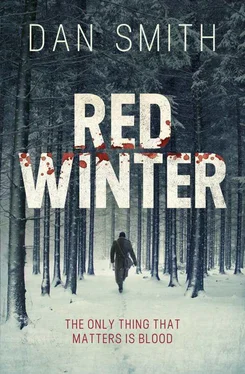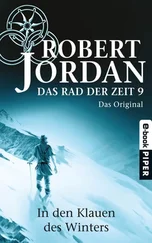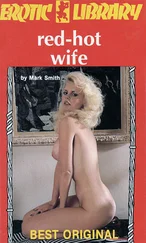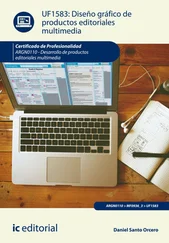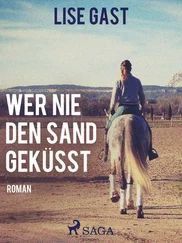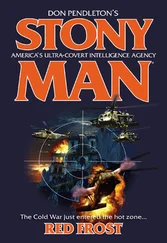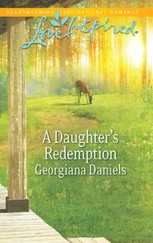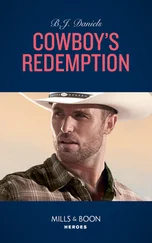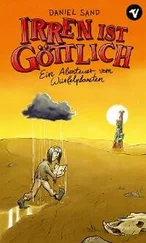‘Do what?’
‘Treat each other with suspicion. Be enemies. We’re all after the same thing.’
‘Are we?’
‘As far as I can tell.’
‘Except you’re Red. I can smell it.’
‘This has gone beyond colours and… ideology. This is about family.’ Commander Orlov had been right about that. He had known what was important.
‘Family.’ Tanya echoed the word and looked at me. She dragged on one of her self-rolled cigarettes and let the smoke drift from her lips.
‘Her mother died from typhus,’ I said, inclining my head towards Anna but keeping my voice low. ‘Years ago. And her father died…’ I had to think about it; the days had blurred into one. ‘Yesterday. He died yesterday.’ An image of Lev’s broken body came to mind. ‘I told her I’d look after her now. And the dog… well, he just came along. Maybe he was looking for a new family.’
Tanya said nothing. She took another drag on her cigarette and contemplated the glowing tip before holding it out to me. I kept my eyes on hers as I accepted it and took a long pull on it, the smoke sharp on my throat, tight in my lungs.
‘Thank you,’ I said.
Standing there, at the edge of the grove, I decided to tell Tanya what she needed to know. If we were going to travel together, the knowledge could prove to be important, and it made sense for us to try to get along, so I gave her the information as both a safeguard and a peace offering. Much like Lev had offered his olive branch of help.
I kept some secrets for myself, but recounted what I had seen in Belev and what had happened at the farm when I met Lev and Anna. I told her about the seven riders, about the bodies we had found on the way to Dolinsk and what Commander Orlov had told me about Krukov and about the prisoners.
As I spoke, Tanya stared into the distance as if she wasn’t listening, and I watched her face for any sign of what she was thinking. She remained composed, blank, questioning nothing, but when I mentioned prisoners, I saw something change in her demeanour. A strained expression as if something had caused her pain, then she looked up and tears glistened in her eyes. She sniffed hard and turned her face so that I could no longer see her.
When I finished speaking, Tanya was silent for a long while before she looked at me.
‘They’re hunting you. I don’t like that. It puts Lyudmila and me at greater risk.’
‘It doesn’t really change anything,’ I said. ‘You and me… we’re following the same trail. We can’t avoid each other, so we might as well be together.’
‘It’s a mistake to think we’ll help if they catch up to you,’ she warned, but she looked back at Anna and I saw the doubt in her eyes.
‘I intend to stay well ahead of them,’ I told her. ‘Lose them, if we haven’t already.’
‘But they’re persistent.’ She turned her face towards me. ‘So I’m wondering who are you, Kolya? Who are you really?’
‘I’m a deserter.’ I shrugged. ‘They hunt deserters.’
‘So you are Red.’
‘I’m not anything anymore. I’m just a man who wants to find his family.’
‘But you’re something more than that. I know it. They don’t send seven to catch one. Not unless the one is special. Dangerous, even.’
‘I’m nobody,’ I said.
‘Don’t ask? Is that it? I don’t ask about you, you won’t ask about me?’
‘It’s better that way. We leave the past behind us; it’s easier for us to be friends.’
‘I don’t think we’ll ever be friends, Kolya, and we can only the leave the past behind if it isn’t chasing us.’ She scanned the steppe as if searching for a glimpse of seven distant riders, and when she looked back at me, I could see she wanted to know more. There were questions in her eyes, on her lips, but things remained unsaid. I didn’t tell her what or where I had deserted from, and I didn’t disclose my connection to Krukov. Those were things she didn’t need to know; things that would almost certainly affect our relationship for the worse and leave one or other of us dead, right there and then in that grove.
While I kept my secrets from Tanya, I knew nothing about her. She gave no information willingly, but there were some things she could not hide and I was beginning to suspect that she was not just a simple peasant. The way she ate when we stopped to rest, the way she rolled her cigarette, the sharpness of her thoughts, the questions she asked, the way she spoke, and the words she used. Everything about her behaviour told me that Tanya was educated. She wasn’t just a farmer’s wife.
‘It seems you’ve learned more about Koschei than I have,’ she said eventually. ‘There’s nothing more I can tell you about him. We’ve been following his signs, looking for the red star and going north, that’s all. But what do you think is drawing him north? Everyone else is going south.’
‘I’ve been wondering the same thing. Maybe the uprising has spread north of here. Maybe something else. They said they had prisoners and that there are holding camps in this area; he could be bringing prisoners here and then he’ll go back.’
‘What stopped him from killing them ?’ There was something odd in the way she stressed that last word.
‘It legitimises what he’s doing,’ I suggested, but it was just an idea. ‘The Red Army always needs new conscripts, and the labour camps need filling. There’s a lot of work to be done, so he takes the young ones. But the old men and women…’
He likes to drown the women.
I took a deep breath and tried not to see the images that flooded my thoughts. ‘…It could be that’s why he split his unit. Prisoners would slow them down, so maybe part of the unit went ahead—’
‘For what?’
‘To find more prisoners? Spread more terror?’ I shook my head and speculated about the reasons Koschei might have to split his unit. I thought about telling Tanya that perhaps they hadn’t just split into two. That maybe there was a third fraction of Koschei’s unit. With the intelligence gleaned at the train, I had convinced myself that Koschei and Krukov were the same man, and it would make sense if a part of that unit were now following me. Koschei and his men might not just be in front of us, but behind us too.
‘And I think we should stop calling him “Koschei”,’ I said. ‘It makes him… less than human. Or more than human. But he isn’t. He’s just a man. We should call him by his name. Krukov.’
Tanya looked at me and nodded once. ‘And this commander on the train, he was sure about that? About Krukov?’
‘He was sure.’ When I told Tanya about my conversation with Commander Orlov, I had bent the truth a little in my favour, leaving out the part about him recognising me, so she might not have been as sure as I was, but I was convinced Krukov was Koschei not because Commander Orlov gave the name to a doctor, but because he gave it to Nikolai Levitsky. He had known who I was from the moment he saw me and had made it clear what he thought of me. When he used Krukov’s name in connection with Koschei, he was telling me the truth, and my knowledge of Krukov only concreted my certainty of that.
Tanya flicked her cigarette into the frosty grass and looked up at the sky. Grey clouds were moving across it now, the pale winter blue almost entirely gone.
‘What did he do to you?’ I asked. ‘What did Krukov do?’
Tanya turned her back on the steppe and switched her attention to Anna, who was sitting close to Tuzik, one hand buried in the thick fur at his neck. There was a change in Tanya’s expression when she looked at Anna. Something of the melancholy I had seen earlier washed across her face like an incoming wave. The sudden softening of her appearance showed me something I’d never witnessed in her before, and for the first time, it occurred to me that her eyes were almost exactly the same colour as Marianna’s. Before now, they had always seemed cold and hard, but the softening transformed her.
Читать дальше
